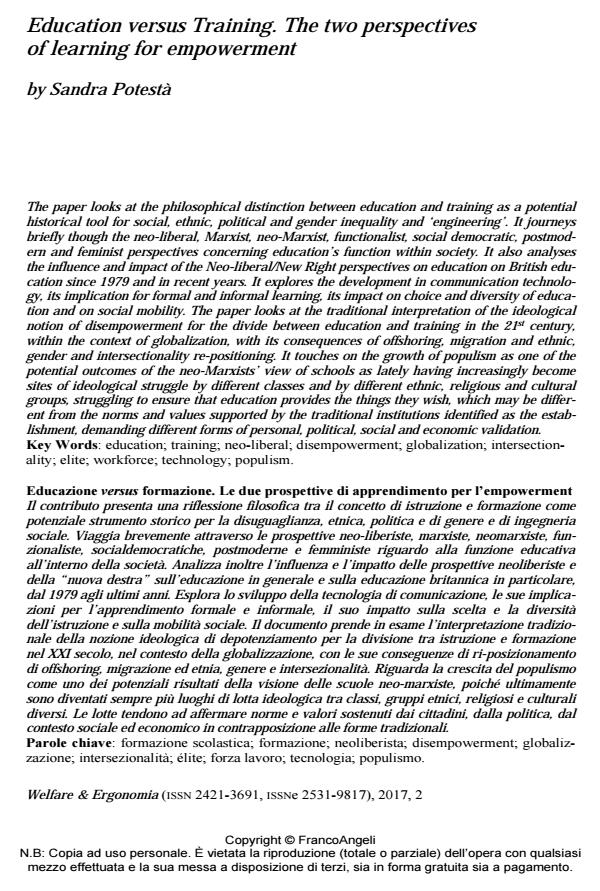Education versus Training. The two perspectives of learning for empowerment
Journal title WELFARE E ERGONOMIA
Author/s Sandra Potestà
Publishing Year 2019 Issue 2017/2
Language English Pages 37 P. 13-49 File size 812 KB
DOI 10.3280/WE2017-002002
DOI is like a bar code for intellectual property: to have more infomation
click here
Below, you can see the article first page
If you want to buy this article in PDF format, you can do it, following the instructions to buy download credits

FrancoAngeli is member of Publishers International Linking Association, Inc (PILA), a not-for-profit association which run the CrossRef service enabling links to and from online scholarly content.
The paper looks at the philosophical distinction between education and training as a potential historical tool for social, ethnic, political and gender inequality and ‘engineering’. It journeys briefly though the neo-liberal, Marxist, neo-Marxist, functionalist, social democratic, postmodern and feminist perspectives concerning education’s function within society. It also analyses the influence and impact of the Neo-liberal/New Right perspectives on education on British education since 1979 and in recent years. It explores the development in communication technology, its implication for formal and informal learning, its impact on choice and diversity of education and on social mobility. The paper looks at the traditional interpretation of the ideological notion of disempowerment for the divide between education and training in the 21st century, within the context of globalization, with its consequences of offshoring, migration and ethnic, gender and intersectionality re-positioning. It touches on the growth of populism as one of the potential outcomes of the neo-Marxists’ view of schools as lately having increasingly become sites of ideological struggle by different classes and by different ethnic, religious and cultural groups, struggling to ensure that education provides the things they wish, which may be different from the norms and values supported by the traditional institutions identified as the establishment, demanding different forms of personal, political, social and economic validation.
Keywords: Education; training; neo-liberal; disempowerment; globalization; intersectionality; elite; workforce; technology; populism.
- Amnesty International in Amnesty (September-October 2000). Human Right Act.
- Ball S.J. (2013). The Education Debate. Bristol: Policy Press. (First published 2008).
- Bintang-Simbolon. Differences Between Traditional and Progressive Education. -- Text available at: https://www.scribd.com/document/344139080/Differences-Between-Traditional-and-Progressive-Education.
- Bogle D. and Maes K. (2014). Good Practice Elements in Doctoral Training. LERU.
- Bolen C. (2006). The Education of Young Men and Women in Regency. The Regency Reader. -- Text available at: http://www.cherylbolen.com/education.htm.
- Bowles S. and Gintis H. (1976). Schooling in Capitalist America: Educational Reform and the Contradictions of Economic Life. New York: Basic Books.
- Callaghan J. (1976). A rational debate based on the facts. Ruskin College Oxford. 18 October. -- Text available at: http://www.educationengland.org.uk/documents/speeches/1976ruskin.html.
- Callender C. (2017). Poorer students aren’t applying to university because of fears of high debts. -- Text available at: http://theconversation.com/poorer-students-arent-applying-to-university-because-of-fears-of-high-debts-78694.
- Carbonnier G., Carton M. and King K., eds (2014). Education, Learning, Training: Critical Issues for Development, Leiden, Boston: Brill, Nijhoff Publishers. DOI: 10.1163/9789004281158
- Cheung A. -- https://www.theguardian.com/world/2017/jun/28/how-china-changed-hong-kong-views-city-handover-1997-uk-residents.
- Ecclestone K., Biesta G. and Hughes M. (2010). Transitions and Learning throughout the life course. London & New York: Routledge.
- Farishtha. Should girls be educated? -- https://www.debate.org/opinions/should-girls-be-educated.
- Giddens A. (1998). The Third Way: The Renewal of Social Democracy. Cambridge Uk, Malden USA: Polity Press.
- Haralambos M. and Holborn M. (2004). Sociology: Themes and Perspectives. Sixth Edition. London: Collins.
- Holland E. (2010). Everyday Life in a Boys’ Public School: Winchester. -- Text available at: http://www.edwardianpromenade.com/great-britain/boys-public-school-winchester/.
- Jackson P.W. (2011). What is Education? Chicago: The University of Chicago Press.
- Johnson L., Adams Becker S., Estrada V. and Freeman A. (2014). NMC Horizon Report: 2014 Higher Education Edition. Austin, Texas: The New Media Consortium.
- Ofsted Inspectorate (2017). Annual Report.
- Paton G. (2014) School leavers ‘better off training for a trade than going to university’. -- Text available at: https://www.telegraph.co.uk/education/universityeducation/10872849/School-leavers-better-off-training-for-a-trade-than-going-to-university.html.
- Rancière J. (1987). Le maître ignorant cinq leçons sur l’émancipation intellectuelle. Paris: Librairie Arthème Fayard.
- Reay D. (2008). Tony Blair, the promotion of the ‘active’ educational citizen, and middle‐class hegemony. Oxford Review of Education, 34(6): 639-650, DOI: 10.1080/03054980802518821
- Rugg G. (2014). Education versus training, academic knowledge versus craft skills: Some useful concepts. Hyde and Rugg, posted on February 23. -- Text available at: https://hydeandrugg.wordpress.com/2014/02/23/education-versus-training-academic-knowledge-versus-craft-skills-some-useful-concepts/.
- The national curriculum in England Key stages 1 and 2 framework document. September 2013.
- Transparency Internationals (2016). The Corruption Perception Index.
- Willis P.E. (c1977). Learning to Labour: How Working Class Kids Get Working Class Jobs Aldershot UK: Gower.
Sandra Potestà, Education versus Training. The two perspectives of learning for empowerment in "WELFARE E ERGONOMIA" 2/2017, pp 13-49, DOI: 10.3280/WE2017-002002